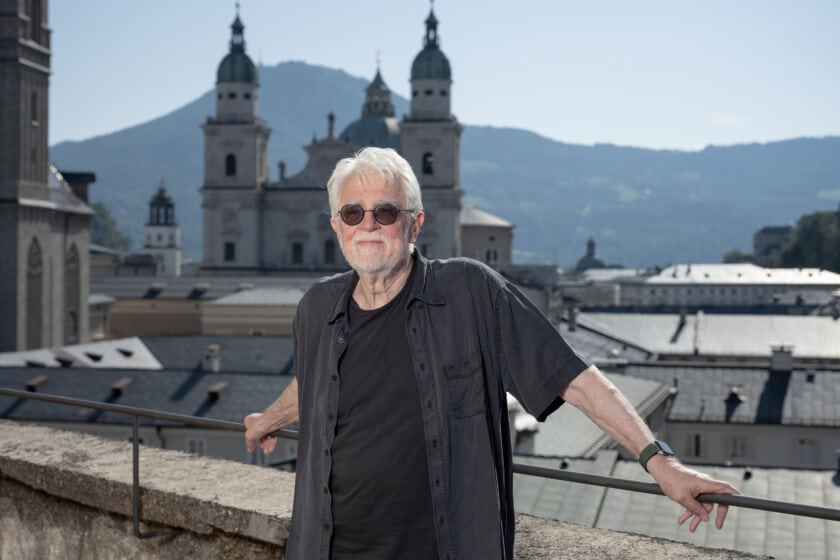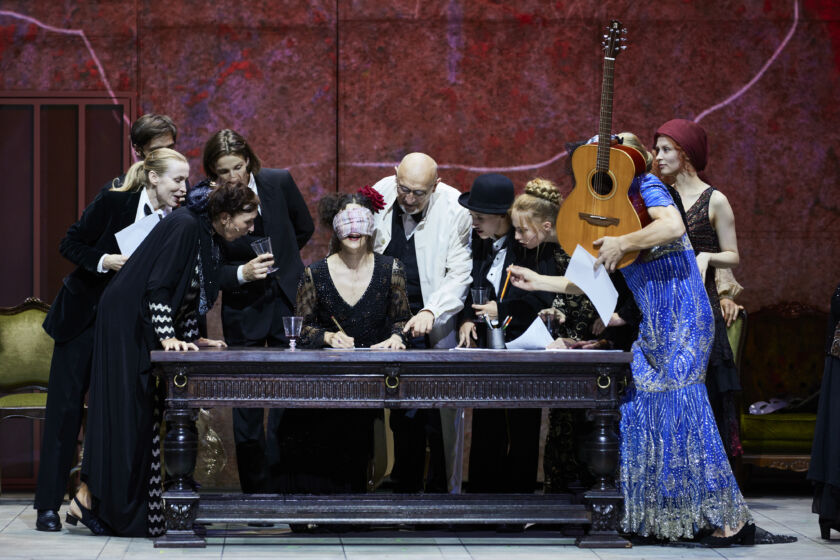The Magic Mountain: A Lesson in Context
The Polish director Krystian Lupa directs The Magic Mountain – in Lithuanian. Is that possible?

“Untranslatable.” That was Fredrik Böök’s description of The Magic Mountain (Der Zauberberg). The Swedish literary scholar, a member of the Nobel Prize committee, was so vehemently opposed to the novel that Thomas Mann received the Nobel Prize in Literature mainly for Die Buddenbrooks. The author himself reacted with extreme astonishment, saying in a speech in 1939 that The Magic Mountain was so much a “German book” that “foreign judges entirely underestimated its world possibilities”.
The Magical Translator. Today, 100 years after its first publication, the magnum opus has been translated into 27 languages – at the Salzburg Festival, it will be heard in Lithuanian, in an adaptation and text version by the Polish director Krystian Lupa, with German and English subtitles. Marina Davydova, the Festival’s director of drama, describes Krystian Lupa as a “philosophical director of modern theatre”. In his productions, he is not only the director, but also the set and lighting designer – and of course the author. As such, he enters into a dialogue with the great writers of world history – he has frequently directed Thomas Bernhard, Robert Musil, W. G. Sebald, Dostoyevsky, and now Thomas Mann. “He starts a dialogue with these authors, and the viewer experiences not only a dialogue between two great personalities, but also between past and present,” says Davydova.
In this context, The Magic Mountain must be considered a “polylogue” – since (at least) three languages are involved, aside from innumerable cultural backgrounds. It is an interesting experiment to take the German language, which Mann wields as such a powerful instrument, out of the equation that is The Magic Mountain. What becomes all the more obvious then is its internationality – the novel’s “world possibilities” which Mann invoked. “Its untranslatability is one of the most attractive elements of The Magic Mountain,” says Krystian Lupa, “but not in the sense which the Nobel committee used as an excuse – this I consider odd and ridiculous.” Rather, it is the diversity of language(s) embodied in the novel – after all, for many of the characters in the novel, German is a foreign language: Settembrini is Italian, Madame Chauchat is Russian, Naphta is Galician, Peeperkorn is Dutch, to name just a few. “The Magic Mountain itself is a magical translator,“ says Krystian Lupa. “What we have here is an international society. And this society approaches language quite differently: when an Italian speaks German – then he is still speaking Italian to a certain degree. Mann also wrote the essential scene with Madame Chauchat in French – even though his own French was very bad – because he himself said: I could not have written it in German.” It is the very same conversation in which Hans Castorp, after a German-French back-and-forth, ultimately cries out: “Oh, I speak German, even in French.”

The Inner Language Barrier. “One might say that people speaking in their mother tongue do not understand one another completely – for they start with quite different intellectual landscapes, if you will. Hans Castorp is particularly prone to this: when he doesn’t understand certain statements by those he is talking to, he translates them almost unscrupulously – with his youthful energy and youthful freedom – into the world of his own understanding. Mutual understanding of people speaking to one another is a fascinating subject to me, and one of the main issues in this novel.” As readers of The Magic Mountain, we are subject to what Lupa describes as Castorp’s energy – in the auditorium at Salzburg’s Landestheater, with Lithuanian in our ears and German and English to read, we can overcome Castorp’s and thereby our own language barrier and change our point of view. “Of course we will do everything to devise the surtitles so that the piece is easy to understand – as if one were watching a film in another language with subtitles,” Lupa assures us, yet explains: “I would never want to watch a movie which is dubbed – for I want to hear the actor’s original voice and what he is telling me with that voice. After all, he is always telling me something a bit different from what I read in the subtitles. There are moments when I am so engrossed in what this original voice is telling me that I stop reading, even if I don’t speak the language – because I still understand. I hope the audience coming to my piece feels a similar effect.”
Translation to Stage. One is tempted to assume that the much-vaunted “untranslatability” of The Magic Mountain refers to the stage as well – how on earth does one manage to give a one-thousand-page novel which consists almost exclusively of conversations and a plethora of characters a stage treatment that does not turn it into a marathon lasting several days? “I believe creating a theatrical equivalent of a story such as The Magic Mountain is impossible,” Lupa, somewhat surprisingly, clarifies, “so I must limit myself to one or two essential motifs – and tell those completely.” What will this look like? “Something I don’t want to lose is the slowness of this process which the novel conveys. After all, these seven years the main protagonist spends at the sanatorium are a major factor in his development.” It is this development, the transformation of Hans Castorp, that Lupa wants to focus on: “What fascinates me is the transformation of a human being from a socially bourgeois person, a product of his epoch, into the person he could potentially be, if only he could tear himself away from mendacious influences. It’s about a human process of becoming oneself. It is very important that Thomas Mann was himself undergoing a profound process of transformation while writing The Magic Mountain.” Mann began writing the novel in 1913 – when World War I broke out, he first considered it a liberation and necessity, even breaking off relations with his brother Heinrich, who opposed the war. When he completed The Magic Mountain in 1924, he had distanced himself from this line of thinking. Lupa, however, has found a second central motif for his adaptation: “At the sanatorium, our main character completely loses his sense of time – and also his sense of meaning. He falls into a kind of non-existence; his original goal is lost. I think that people must lose their sense of their own meaning in order to recognize humanity’s global loss of meaning, which ultimately leads to war.” Sometimes one must take a step back in order to recognize the larger context.
Barbara Wallner
Translation: Alexa Nieschlag
First published on 11.05.2024 in Die Presse Kultur Spezial: Salzburg Festival
